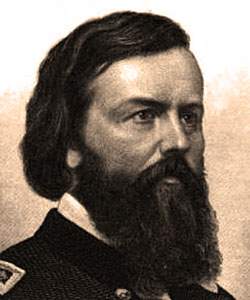John Pope (American National Biography)
Scholarship
[Pope] saw his first Civil War action in Missouri in late 1861 when his Illinois unit was assigned to John C. Frémont's Department of the West. In March 1862 Pope took command of the Army of the Mississippi and that same month captured New Madrid, Missouri, in a lightning campaign, moving on in April to take Island Number 10 in a joint army-navy operation that opened the Mississippi south to Memphis. In May he led his army against Corinth, Mississippi, as the left wing of Henry W. Halleck's Grand Army.
In June 1862, while George B. McClellan and the Army of the Potomac were attacking Richmond, Abraham Lincoln called Pope to Washington to command a new Army of Virginia, which would guard Washington, drive the Confederates out of the Shenandoah Valley, and help McClellan by drawing Confederate forces away from Richmond. Pope was a questionable choice. A Republican, he was expected to support McClellan, a Democrat and his rival. Fellow officers mistrusted Pope as a blowhard, more so when easy conquests in the West led him to boast about western victories and scoff at eastern defeats. Pope did not in fact want the command, saying that it put his fate in McClellan's hands. Anything that tied up McClellan could leave Pope's army in the field alone. Only Lincoln's personal coaxing and promises to stand behind Pope whatever happened convinced a reluctant Pope to accept.
In June 1862, while George B. McClellan and the Army of the Potomac were attacking Richmond, Abraham Lincoln called Pope to Washington to command a new Army of Virginia, which would guard Washington, drive the Confederates out of the Shenandoah Valley, and help McClellan by drawing Confederate forces away from Richmond. Pope was a questionable choice. A Republican, he was expected to support McClellan, a Democrat and his rival. Fellow officers mistrusted Pope as a blowhard, more so when easy conquests in the West led him to boast about western victories and scoff at eastern defeats. Pope did not in fact want the command, saying that it put his fate in McClellan's hands. Anything that tied up McClellan could leave Pope's army in the field alone. Only Lincoln's personal coaxing and promises to stand behind Pope whatever happened convinced a reluctant Pope to accept.
Walter N. Trenerry, "Pope, John," American National Biography Online, February 2000, http://www.anb.org/articles/05/05-00627.html.







